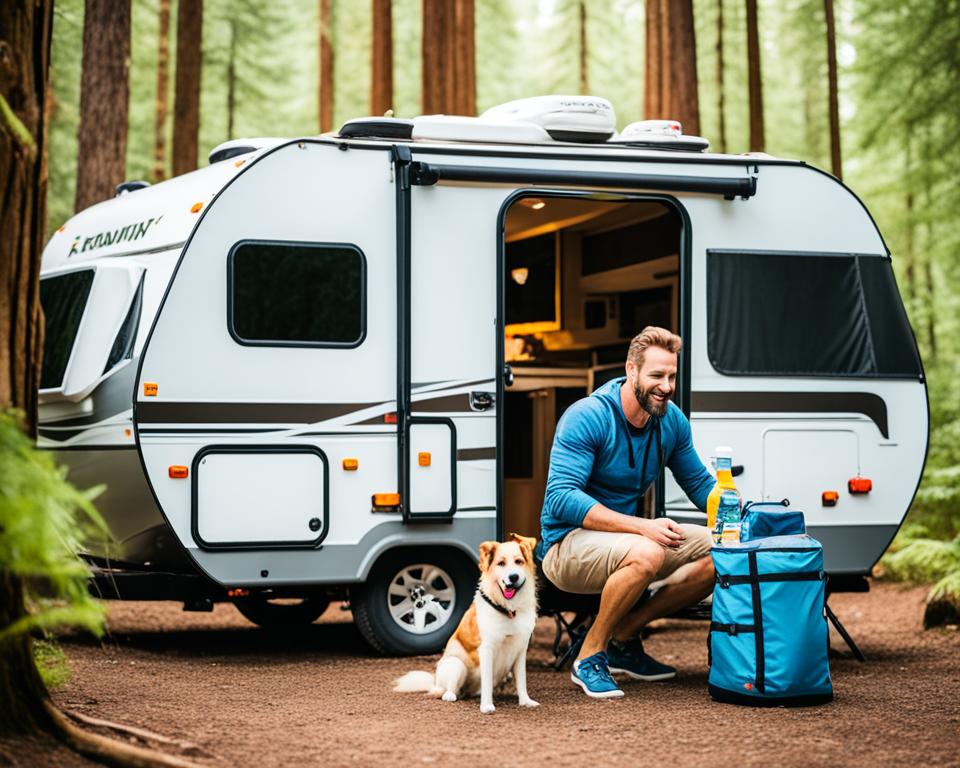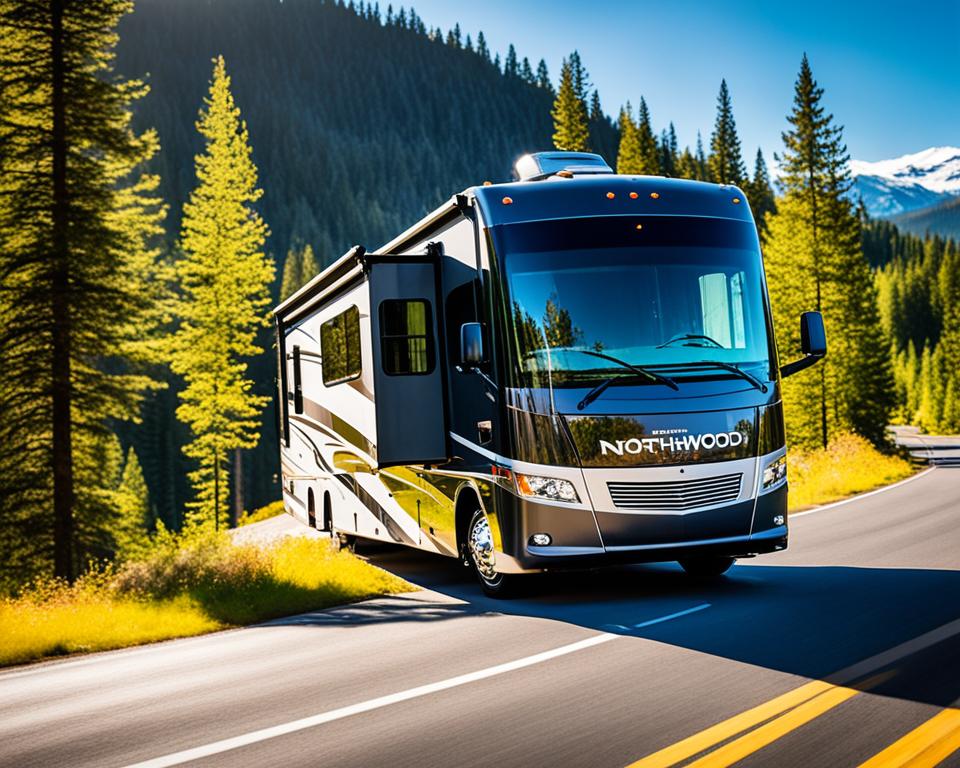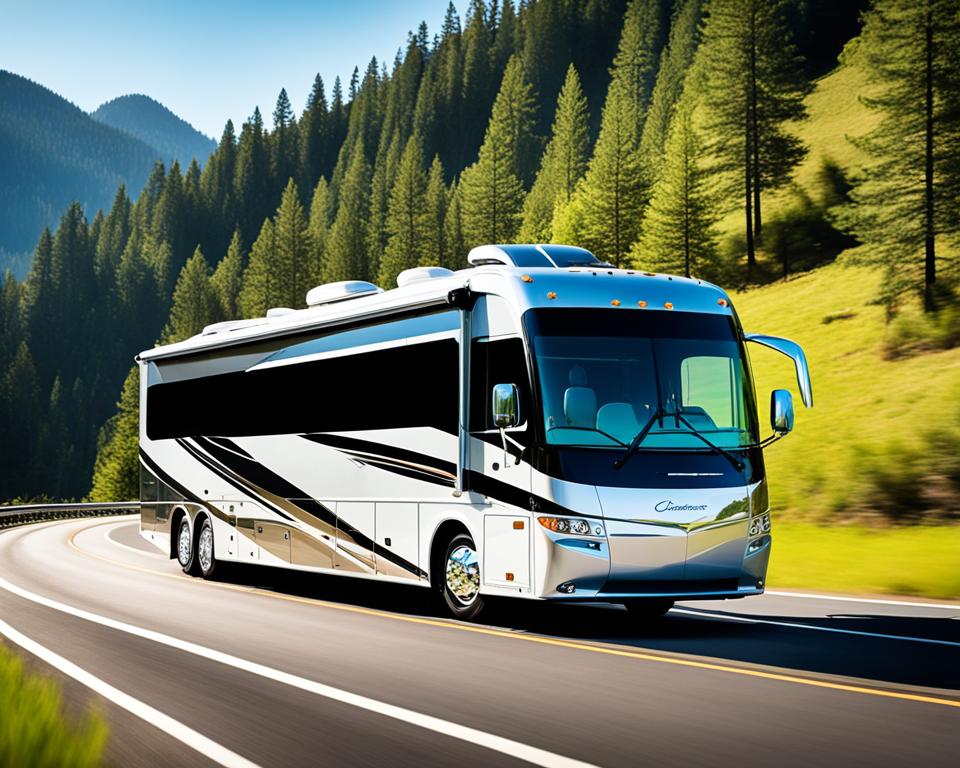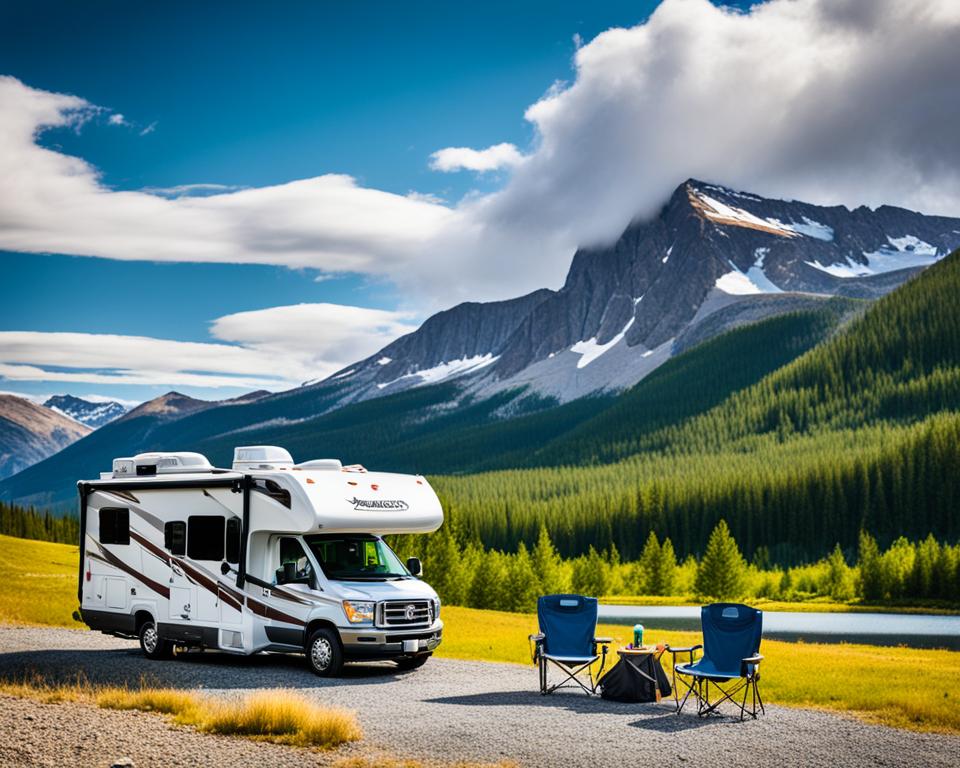If you’re planning an RV trip and want to bring your beloved furry friend along, you’re not alone. According to a survey conducted by Go RVing, 68% of RV owners travel with pets. Whether you’re a seasoned RV traveler or new to the experience, there are important considerations to make when traveling with pets in your RV. This article will provide you with the best tips for a pet-friendly RV travel experience, ensuring the safety, comfort, and enjoyment of both you and your pet throughout your journey.
From pet-friendly campgrounds to essential items to have on hand, we’ll cover everything you need to know to make RV travel with pets easier and more enjoyable. So, whether you’re traveling with a dog, cat, or any other furry companion, let’s explore the essentials of traveling with pets in your RV.
Key Takeaways:
- Bringing your pet’s favorite bed provides comfort and familiarity.
- Crating your pet while traveling ensures their safety.
- Bring sufficient food and water for the journey.
- Make sure your pet is up to date on vaccinations and has a health certificate.
- Research pet-friendly campgrounds and inquire about their policies.
Take Your Pet’s Favorite Bed with You
Bringing your pet’s favorite bed along on your RV trip provides them with a sense of familiarity and comfort. The smells and familiar surroundings of their bed can help them feel more at ease in the new environment. Additionally, stopping frequently during your journey to allow your pet to stretch and relieve themselves is important for their well-being.
Traveling with pets can be stressful, especially if they are not accustomed to being on the road. But having their favorite bed with them can make a world of difference. The familiar scent and cozy feel of their bed will provide them with a sense of security and reduce anxiety during the trip.
When choosing a bed for your pet, consider their size and sleeping preferences. Some pets prefer soft, plush beds, while others may prefer a firmer surface. It’s also important to choose a bed that is easy to clean and maintain, as it will likely accumulate dirt and pet hair during the journey.
During your RV travel, it’s crucial to make frequent stops to allow your pet to stretch their legs and relieve themselves. By incorporating short walks and bathroom breaks into your itinerary, you can ensure their physical and mental well-being. Additionally, this gives your pet an opportunity to explore their new surroundings and burn off some energy.
Benefits of Bringing Your Pet’s Favorite Bed:
- Gives them a sense of familiarity and comfort in a new environment
- Reduces anxiety and stress during travel
- Provides a cozy and secure sleeping space
- Helps regulate body temperature, especially during colder nights
- Easy to clean and maintain
“Having their favorite bed with them can make a world of difference.”
Remember that your pet’s well-being should be a priority during your RV travel. By taking their favorite bed with you and making frequent stops for exercise and bathroom breaks, you can ensure a comfortable and enjoyable journey for both you and your furry companion.
Crate Your Pet While Traveling
To ensure the safety of your furry friend during RV travel, it’s crucial to crate them while on the road. Unlike cars, RVs do not have seat belts designed for pets, making it essential to secure them in a pet carrier. By crate training your pet and providing a comfortable environment with a cozy blanket or two, you can protect them from potential dangers and distractions while driving.
Traveling in a crate has multiple benefits for both you and your pet. Firstly, it prevents them from roaming freely in the RV, which can lead to accidents or injuries. Secondly, it creates a designated and safe space for your pet, ensuring their comfort and reducing anxiety during the journey. Lastly, in the event of sudden stops or turns, the crate serves as a protective enclosure, buffering any potential impact and keeping your pet secure.
When choosing a pet carrier, make sure it is suitable for your pet’s size and needs. The crate should be well-ventilated, sturdy, and easily secured within the RV. Additionally, consider crate training your pet before the trip to help them acclimate to their new travel environment. Familiarize them with the crate by gradually increasing their time spent inside and providing positive reinforcement with treats or toys.
Remember, it’s essential to prioritize your pet’s safety and comfort during RV travel. By crate training them and providing a secure and cozy space, you can enjoy a worry-free journey while ensuring your pet’s well-being.
Benefits of Crating Your Pet While Traveling:
- Ensures their safety during sudden stops or turns
- Prevents accidents or injuries by restricting movement
- Reduces anxiety by creating a familiar and secure space
- Provides a designated area for rest and relaxation
- Allows for better focus on driving without distractions
| Product | Features | Price |
|---|---|---|
| Petmate Two Door Top Load | Two-door design, durable plastic construction, top handle for easy transport | $25.99 |
| AmazonBasics Portable Folding Soft Dog Crate | Fabric construction, mesh windows, removable fleece mat | $60.99 |
| MidWest Homes for Pets Spree Travel Carrier | Secure bolt and wingnut fasteners, easy-grip handle, ventilation on all sides | $34.99 |
Water and Food
When traveling with pets in an RV, it’s important to prioritize their nutritional needs. Bring the food they are accustomed to and enough water to last the trip. Changing their water source can cause stomach upset, so it’s best to provide them with the familiar water they are used to from home.
It’s also a good idea to have a backup supply of bottled water in case you run out. This ensures that your pet remains hydrated and healthy throughout the journey.
| Essentials for Water and Food | Benefits |
|---|---|
| Bring enough pet food for the entire trip | Eliminates the need to search for specific pet food brands on the road. |
| Carry the type of water your pet is accustomed to | Minimizes the risk of stomach upset caused by switching water sources. |
| Have a backup supply of bottled water | Ensures that your pet stays hydrated and healthy even if you run out of fresh water. |
“Feeding your pet with their familiar food and water while on an RV trip provides them with a sense of comfort and reduces the risk of digestive issues. Remember to bring enough food and water to sustain your pet during the entire journey.”
Vet Checks
Before embarking on your RV trip, it’s crucial to prioritize your pet’s health by taking them for a comprehensive veterinary check-up. This ensures that they are in optimal health to handle the adventures and challenges of RV travel. By making vet checks a priority, you can address any potential health concerns and provide appropriate preventative care for your furry companion.
Keeping your pet’s vaccines up to date: During the veterinary check-up, it’s important to ensure that your pet’s vaccinations are current. This is especially crucial for RV travel, as your pet may come into contact with other animals and new environments that could increase their risk of exposure to diseases. By ensuring that their vaccines are up to date, you can help protect them from potential illnesses.
Discussing additional health precautions: In addition to vaccines, it’s essential to discuss any specific health concerns or precautions with your veterinarian. They can provide valuable advice on protecting your pet from parasites, such as ticks and fleas, as well as recommending appropriate preventive medications. If your pet has any pre-existing health conditions, your vet can provide guidance on managing them during your RV trip.
Proof of rabies vaccination and health certificate: It’s important to have proof of your pet’s rabies vaccination and current health certificate with you while traveling in your RV. These documents may be required if you visit certain campgrounds or encounter any travel restrictions. Keep them easily accessible in case of emergency or if requested by authorities.
“Taking your pet for a check-up before RV travel is not only a precautionary measure but also a responsible choice as a pet owner. By addressing any health concerns and ensuring preventative care, you can provide a safe and enjoyable travel experience for your furry friend.” – Dr. Jenna Carter, DVM
Micro-chipping your pet: Losing a pet can be a frightening experience, especially when you’re on the road. To increase the chances of a lost pet being reunited with you, consider micro-chipping your pet and registering their chip number in the National Pet Microchip Registration Database. This simple step can be a lifesaver if your pet accidentally wanders off or gets separated from you during your RV travels.
By prioritizing vet checks before your RV trip and taking appropriate precautions, you can ensure the well-being and happiness of your pet throughout your travel adventures.

| Vet Checks for Pets: Key Points |
|---|
| Ensure vaccines are up to date |
| Discuss additional health precautions with your vet |
| Have proof of rabies vaccination and health certificate |
| Consider micro-chipping your pet |
Ask About Pet Policies
Before making campground reservations for your pet-friendly RV travel, it’s important to inquire about the pet policies at each location. Not all campgrounds are accommodating to pets, and some may have specific pet guidelines or restrictions in place. By researching the campgrounds you plan to stay at, you can ensure a hassle-free and enjoyable experience for you and your furry companion.
Pet Policies Checklist
When contacting campgrounds, consider asking the following questions to understand their pet policies:
- Are pets allowed at the campground?
- Are there any breed restrictions or Breed Specific Legislation (BSL)?
- Are there any limitations on the number of pets allowed per site?
- Do they charge any additional fees for pets?
- Are there designated pet areas or dog parks within the campground?
- Are there any specific rules or regulations regarding leashing or cleaning up after pets?
Remember, it’s always better to clarify any doubts or concerns about the pet policies before arriving at the campground. This way, you can avoid any last-minute surprises or disappointments during your RVing with pets adventure.
Pet-Friendly Alternatives
If you encounter a campground that doesn’t allow pets or has strict regulations, don’t worry! There are still options available for pet-friendly RV travel. You can explore alternative campgrounds in the area that welcome pets, or consider staying at pet-friendly hotels or resorts that offer RV accommodations. Researching these alternatives ahead of time will ensure that both you and your pet are well taken care of throughout your journey.
| Campground | Pet Policy |
|---|---|
| Nature’s Retreat Campground | Pets allowed on leash; dog park available |
| Mountain View RV Park | No pets allowed |
| Ocean Breeze Campgrounds | Pets allowed with breed restrictions; additional fee applies |
| Gorgeous Pines Resort | Pets allowed; dog-friendly hiking trails nearby |
Exploring the pet policies at different campgrounds ensures that you and your furry friend can enjoy RVing together without any concerns or issues. By staying at pet-friendly accommodations, you can create lasting memories and adventures while providing a comfortable and safe environment for your beloved pet.
Local Emergency Information
When embarking on an RV travel with your pets, it’s crucial to be prepared for any emergencies that may arise. Knowing the local emergency information, including the contact details of a nearby veterinarian or pet hospital, can ensure the well-being of your furry companions during your travels.
One way to find local emergency vet services is by utilizing online resources. Websites and directories dedicated to pet services can help you locate vet clinics or hospitals in the area where you will be staying. It’s advisable to research and save the contact information of multiple options, ensuring you have backup options available in case of unexpected circumstances.
In addition to traditional methods of finding local emergency vet services, consider using a pet portal service. These platforms allow you to access your pet’s records remotely, which can be useful in case of emergencies. By having your pet’s medical history readily available, vet professionals can provide better and more informed care when the need arises.
Why is it Important?
Having local emergency information for pets is important because it provides peace of mind and allows you to act quickly in case of emergencies. By knowing the nearest vet clinic or pet hospital, you can seek immediate medical attention for your pet if the need arises. This can be particularly critical in situations requiring urgent treatment or 24-hour care.
Additionally, unfamiliar environments and new surroundings during RV travel can sometimes cause stress or health issues for pets. Timely access to emergency vet services ensures that your pets receive the necessary care and treatment, helping to alleviate any discomfort or health complications they may experience on the road.
Stay Prepared on Your RV Adventures
As a responsible pet owner, it is important to prioritize the well-being of your pets while traveling in an RV. Knowing the local emergency information, including contact details for veterinary services in the area, contributes to a safe and enjoyable experience for both you and your furry companions.
Keep in mind that emergencies can happen at any time, so it’s best to be well-prepared. By doing so, you’ll be ready to handle any unexpected situations that may arise during your RV adventure, ensuring the health and safety of your beloved pets.

Protective Items
To ensure the safety and well-being of your pet during RV travel, it’s important to consider bringing protective items that can help protect them from various hazards. Here are some essential protective items to consider:
- Paw Booties: When exploring the outdoors during your RV trip, your pet’s paws may come into contact with hot surfaces or rugged terrain. To protect their paws from burns or injuries, consider bringing paw booties. These protective coverings can shield their delicate paws from heat, sharp objects, and uneven surfaces.
- Raincoat: Wet weather can be unpredictable during RV travels. To keep your pet dry and comfortable, consider packing a raincoat designed specifically for pets. A raincoat can protect them from getting soaked and help them maintain their body temperature in inclement weather.
- Towel: Having a towel near the entry door of your RV can be a lifesaver for both your pet and your vehicle’s cleanliness. By wiping their paws before they enter, you can prevent mud, dirt, or other debris from being tracked inside. This not only helps keep your RV clean but also ensures your pet’s comfort and hygiene.
By packing these protective items, you can take proactive measures to keep your pet safe and comfortable during your RV travels.
Day Excursions
When planning day excursions while RVing with pets, it’s important to ensure their safety and comfort while you are away. Provide proper ventilation, access to fresh water, and consider using calming music or leaving the TV on a soothing channel to distract them from outside activity. If you need to leave them for an extended period, research nearby pet boarding facilities or inquire if the campground offers kennels or boarding services.
Conclusion
RV travel with pets can be an incredible adventure for both you and your furry companion. By following these top tips for traveling with pets in an RV, you can ensure a safe and enjoyable journey for your pet.
One of the key aspects of a successful trip is careful planning. Research pet-friendly campgrounds and accommodations along your route to find the best options for you and your pet. Prioritize their well-being by bringing their favorite bed and ensuring they have access to enough food and water throughout the trip.
Remember to prioritize your pet’s safety as well. Crate them while traveling to protect them from potential hazards on the road. Take the time to schedule a vet check-up before hitting the road and ensure you have all necessary documentation, including proof of rabies vaccination and a current health certificate.
With proper preparation and consideration, RV travel with pets can create lasting memories and strengthen the bond between you and your pet. So grab your furry friend, hit the open road, and embark on a pet-friendly RV adventure of a lifetime!
FAQ
Should I bring my pet’s favorite bed on an RV trip?
Yes, bringing your pet’s favorite bed along on your RV trip provides them with a sense of familiarity and comfort in the new environment.
Why is it important to crate my pet while traveling in an RV?
Crating your pet while on the road is essential for their safety. Unlike cars, RVs do not have seat belts for pets, so securing them in a pet carrier with a comfy blanket is crucial.
How much water and food should I bring for my pet on an RV trip?
It’s important to bring enough water and food to last the entire trip. Changing their water source can cause stomach upset, so it’s best to provide them with the familiar water they are used to from home.
Should I take my pet to the vet before going on an RV trip?
Yes, it’s crucial to take your pet to the vet for a check-up before embarking on an RV trip. Ensure their vaccines are up to date and discuss any other health precautions you should take.
Should I inquire about pet policies at campgrounds before making reservations?
Yes, it’s important to inquire about pet policies at campgrounds before making reservations. Not all campgrounds are pet-friendly, and some may have Breed Specific Legislation or insurance guidelines that prohibit certain breeds.
What should I do in case of a pet emergency while on an RV trip?
It’s important to know the contact information of a local veterinarian or pet hospital in the area you are traveling to. Research and have their information readily available in case of an emergency.
What protective items should I bring for my pet on an RV trip?
Consider bringing paw booties to protect their paws from hot surfaces or rugged terrain. A raincoat can also be useful to keep them dry in wet weather.
What should I do with my pet when I go on day excursions while RVing?
When leaving your pet in the RV for day excursions, ensure proper ventilation and access to fresh water. Consider using calming music or leaving the TV on a soothing channel to keep them relaxed.
Is it important to consider pet-friendly accommodations when planning an RV trip?
Yes, it’s essential to research and choose pet-friendly campgrounds and accommodations for your RV trip to ensure a pleasant experience for both you and your furry friend.














